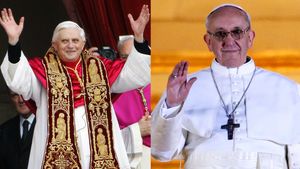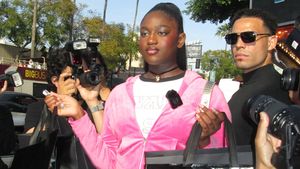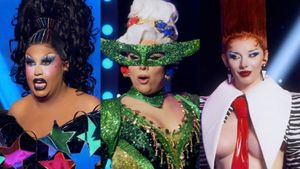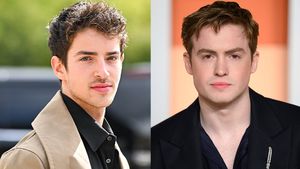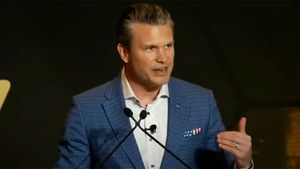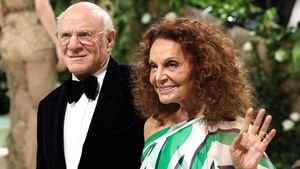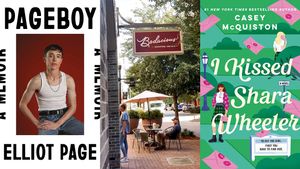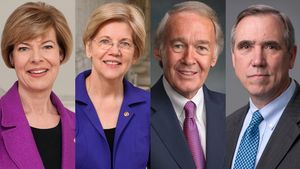If you haven’t been watching DC Universe’s Doom Patrol, you're missing out on one of the biggest (and queerest!) treats of television in 2019!
![]()
The quirky series follows the misadventures of a racecar driver stuck in a robot body, a self-loathing, gay, ex-military pilot with an energy-being living inside him, an egotistical Norma Desmond-esque film star who devolves into a pile of goo when she’s upset, a teenager with dissociative identity disorder who has a different superpower for each of their personalities, and a literal rat with the same tortured backstory as Batman. It shouldn’t work, but it bizarrely comes together to be one of the most emotionally resonate series within the live-action superhero genre.
And last week, Doom Patrol delivered TV's queerest live-action story yet, with a story focusing on a genderqueer character named Danny Street who is—quite literally—a sentient street in Springfield, Ohio. Yes, you read that right: a sentient, genderqueer street.
Trying to explain the plot of this episode of Doom Patrol is like trying to describe the idea of music or the number four, but here goes, nothing: Cyborg (yes, that Cyborg, played by Joivan Wade) and the aforementioned pilot (Negative Man, voiced by Matt Bomer), receive a birthday cake from their missing mentor with a map of Springfield, Ohio printed on it. The two follow the map to Danny Street, a sentient, teleporting stretch of road that has become a safe haven for those who "fall through society’s cracks." By talking to Danny through banners, electric signs, and karaoke machines, Negative Man and Cyborg learn that the street is on the run from the Bureau of Normalcy, an agency that eliminates anything "abnormal."
![]()
![]()
Working with the Danny Street's citizens and Maura (a trans woman of color who used to hunt Danny but then came out when she finally met the street, played by Alan Mingo Jr.), Negative Man and Cyborg manage to fight off the Bureau. And in between all that, they still find time to sing a rendition of Kelly Clarkson’s "People Like Us."
If you only understood half of that, you’re ahead of the class (and that was only one of the episode’s plots).
Despite all the craziness, amongst the insanity of Doom Patrol's story lies one of the most powerful queer episodes put to screen, both in its themes and representation.
Firstly, to my knowledge, Maura is the first significant trans woman of color to appear in a superhero show. We get to see her transformation from a closeted government agent scared to be themselves to an out and proud drag performer. Despite her roots, she becomes a strong ally to other queer folks, immediately calling out anyone who misgenders Danny. She’s even self-sacrificing, willing to pretend to be a man again to save Danny. Where most shows would leave Maura to that cruel fate, Doom Patrol instead has Maura lead the charge against the Bureau, in full drag. When her former boss yells, "What the hell has this abomination done to you? You’re a man," she easily beats the Bureau agent while triumphantly stating, "You don’t get to tell me or anyone else who they are ever again. I am proud of the person I see in the mirror."
Maura’s arc highlights the episode (and show’s) theme of building community and finding power with those who society sees as misfits, an idea that continually resonates within the LGBTQ community. Danny Street is the physical, sentient embodiment of all the small safe havens and neighborhoods that the queer community continually creates for ourselves. Yet, non-community members like Cyborg and Negative Man are initially unwilling to believe such a place could exist in their own backyard, even in a world filled with superheroes and villains. Meanwhile, the government, represented by the Bureau of Normalcy, knows full well Danny exists and tries to kill them, mirroring how queer communities have historically been the victims of abusive by authority. It’s no accident that the episode’s climatic battle mirrors the events of Stonewall, right down to trans women of color leading the charge.
Yet, what makes Doom Patrol’s story so powerful is that it doesn’t dwell on the pain, but instead hones in on the joy that one finds being a part of a familial community. Negative Man has spent most of the season trying to deal with his self-hatred at the energy being inside of him, a not-so-subtle metaphor for his internalized homophobia. He’s finally given a moment of catharsis when Danny invites him to sing Clarkson’s "People Like Us." While he is initially reluctant, once onstage, we see him literally come out of his shell. He sheds the rags that hide his typically scarred face to show us the beautiful man beneath, if only for the length of the song. As Negative Man belts, "Oh, people like us we’ve gotta stick together/ keep your head up, nothing lasts forever/we are all misfits living in a world on fire/sing it for the people like us," in a trio with trans woman Maura and genderqueer Danny, it’s hard to debate that you’re watching anything but a pure celebration of queerness. (And on a DC Comics superhero show no less.)
![]()
Doom Patrol shows that while being queer should be celebrated, it also becomes a source of strength when you join together with other "outcasts." As Maura states at the end of the episode to the Bureau, "My face is beat. My look is flawless. And I am dulcet from head to toe. The only thing I am not is scared of you."
Doom Patrol puts the unbreakable wit, will, and wisdom of the LGBTQ community on full display each and every episode. If you haven’t started watching it yet, you need to take a walk down Danny Street and join the growing throng.
Doom Patrol is currently streaming on DC Universe! Check out the trailer for the show in the video below!
Jessie Earl is the host of PRIDE's Nerd Out and has her own LGBTQ, geek-focused YouTube channel!


















































